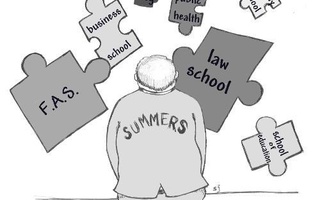As Harvard Law School moves to depart from Harvard’s newly centralized procedures for investigating cases of alleged sexual misconduct, a group of Law professors continue to criticize the University-wide policy that defines sexual harassment, claiming that it offers lackluster protections of academic freedom.
The University’s central policy, which applies to all of Harvard’s schools and took effect last year, defines sexual harassment as “unwelcome conduct of a sexual nature” including “verbal, nonverbal, graphic, or physical conduct of a sexual nature.”
{shortcode-a62cb59fe7d4ac6a5625ea82e0c0ed3a355ab41d}
The policy includes a stipulation that it will not “be construed to abridge academic freedom and inquiry, principles of free speech, or the University’s educational mission.” But some professors at the Law School, many of whom have previously vocally criticized the policy, say that it is not enough.
According to some Law School professors critical of the policy, the verbal definition of sexual harassment could endanger academic inquiry on topics of human sexuality, like rape law, as they claim Harvard’s policy does not also provide adequate protections of academic freedom.
Calling the policy’s statement on academic freedom “unhelpful,” Janet E. Halley, a Law School professor, argued that “speech [in an academic context] can be a form of sexual conduct under the policy, and if it’s unwanted, speech acts could become the basis for charges of sexual harassment.”
Professors, including Halley, aired criticism of the policy’s protection of academic freedom last fall both in an open letter to the Boston Globe and in an internal memo, circulated among the Law School’s faculty, that recommended changes to Harvard’s approach to handling cases of sexual harassment.
The internal memo, dated November, requested that the Law School protect academic freedom as did its former sexual harassment policy, passed in 1995. The old Law School policy featured more than one example delineating proper and improper conduct and academic freedoms.
“Any new policy must contain at a minimum the free speech protection incorporated in the 1995 HLS [Sexual Harassment] Policy through interpretive guidance and illustrations,” 20 professors wrote in the November memo. All 20 professors who signed the memo were also signatories of the October open letter in the Globe.
One signatory, Law School professor Jeannie C. Suk, authored an essay in the New Yorker this past winter on the topic of teaching rape law and advocated for teaching the subject at a recent Law School event. In an interview, Suk argued that Harvard’s policy does not offer enough explicit protection for teaching rape law.
The University’s policy could “drastically limit what students and professor can say about issues that I think they should be free to talk to about,” said Elizabeth Bartholet, a Law School professor who signed the memo and open letter.
For her part, University Title IX Officer Mia Karvonides defended the policy’s protections of academic freedom. She wrote in an email that “academic freedom is one of Harvard’s most fundamental values” and that under the policy, students and professors may discuss “sexually provocative or offensive material” when it is relevant to academic discussion.
Law School faculty members continue to criticize Harvard’s sexual harassment policy even as the Law School plans to implement new school-specific investigation procedures that differ significantly from the University’s central framework. In December, the Law School adopted a set of sexual harassment procedures that bypasses the University’s central investigation office so that the school may conduct investigations in-house. They will be implemented “as soon as possible,” according to Law School spokesperson Robb London.
—Staff writer Andrew M. Duehren can be reached at andy.duehren@thecrimson.com. Follow him on Twitter @aduehren.
Read more in News
Divest Harvard To Create Alumni Fund, Donation Conditional on DivestmentRecommended Articles
-
Slessor Sees Power Policy Needed by USThe United States must ultimately use power to back up its foreign policy, Sir John C. Slessor, Marshal of the
-
Our Men in HavanaP RESIDENT FORD'S admission, in his September 16 press conference, that the United States had intervened in Chile's internal affairs
-
 Making Our Education Whole
Making Our Education Whole -
'The Ptashne Fiasco':In the beginning, there was confusion. The money managers were neophytes in the world of "venture capitalism": the academics had
-
Ducking OutT HERE ISN'T muct sense in deriding President Reagan just to score political points. Given half a chance, or one
-
HCUA Execs Ask Demise of HCUAThe executive committee of the Harvard Council for Undergraduate Affairs has recommended that the Council be abolished and replaced with













